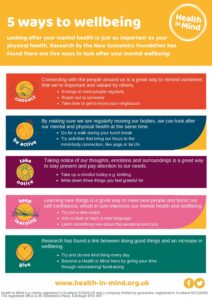Emotional Wellbeing for Parents and Children
Caring for your emotional wellbeing is just as important as looking after your physical health, especially during pregnancy and your child’s early years. Taking care of your emotional health helps you build strong, loving relationships with your child and creates a safe, nurturing environment for them to grow.
Looking after yourself as a parent
Pregnancy and parenting can bring joy, but also stress, fatigue, and moments of doubt. Your emotional wellbeing matters – for you, and for the bond you’re building with your child. Here are some top tips to support your emotional wellbeing:
Ask Yourself:
- Am I getting enough rest?
- Have I eaten and stayed hydrated today?
- Have I spent any time outdoors?
- Have I moved my body, even a little?
- Did I take a moment just for me?
Five Ways to Wellbeing:
- Connect – Reach out to friends, family, or parent groups.
- Be Active – Walk, stretch, or move in a way that feels good.
- Take Notice – Be mindful of the moment and how you’re feeling.
- Keep Learning – Try something new or revisit an old interest.
- Give – Acts of kindness boost your mood, too.
Building a bond with your baby
Your relationship with your baby starts before birth and continues to grow in the early months and years. Babies thrive on love, closeness, and attention. You can build a bond with your baby and support their emotional wellbeing by following Five to Thrive:
TALK: Read and sing to your child; narrate daily activities to build their understanding.
PLAY: Outdoor time is enriching—talk about what you see and hear.
RELAX: Make time for quiet, undistracted moments together.
CUDDLE: Physical affection builds security—babies thrive on closeness.
RESPOND: Learn your baby’s cues and meet their needs with warmth and patience.
Remember, all parents struggle at times, If you’re finding it difficult, don’t suffer in silence. Visit Total Wellbeing Luton to access free support services.
Resources
Supporting your toddler through emotional development
As your baby becomes a toddler, parenting brings new challenges—and new joys. Your child will be more mobile, curious, and emotional.
Helping Children Understand Emotions
As your child learns to speak, they’ll also begin expressing emotions more clearly and learning how to manage them. You can help by:
- Naming their feelings: “You’re sad because it’s time to stop playing.”
- Praising emotional effort: “You’re being so brave trying something new!”
- Recognising their challenges: “You’re staying calm, even though the puzzle is tricky—well done!”
- Try mirroring their facial expressions to show empathy. This helps your child feel seen and understood.
Routines and Transitions
Having a predictable routine helps children feel safe. Regular meal and bedtimes give the day structure and reduce uncertainty. Transitions (like finishing playtime or getting ready to leave the house) can be hard for young children.
Try this tip:
“In 5 minutes, we’re going to have lunch. Then we can play with your bricks again.”
Toddlers don’t understand what “5 minutes” means so use a timer with a sound to help them recognise when time is up.
Daily Play – Simple, Powerful, and Free
You don’t need fancy toys to help your child thrive. Just 10–15 minutes a day of child-led play can make a big difference.
Fun ideas:
- Role-play: Use old clothes or kitchen items to pretend cook or have a tea party.
- Caring for dolls or teddies: Use real baby items like nappies or bottles to pretend care for a “baby.”
- Dressing up: Use scarves, hats, or accessories you already own to inspire imagination.
This kind of play supports emotional understanding, language development, and connection between you and your child.
These early years are full of change but also full of opportunities to build a strong, loving connection. By providing comfort, structure, encouragement, and play, you’re helping your child build the emotional tools they’ll carry for life.
Your toddler may be more independent, but they still need you close. Children learn emotional resilience and confidence from your calm and responsive presence and by continuing to follow the principles of Five to Thrive.
You’re Not Alone
Parenting is never perfect and that’s ok.
Our Parenting Puzzle course supports parents with looking after their emotional wellbeing and provides parenting tools and strategies to support a happy and healthy family life
If you’re struggling with your mental health or just feeling overwhelmed, you are not alone. Reach out for support.
Free, confidential services are available to help you care for your emotional wellbeing at every stage of parenthood.




